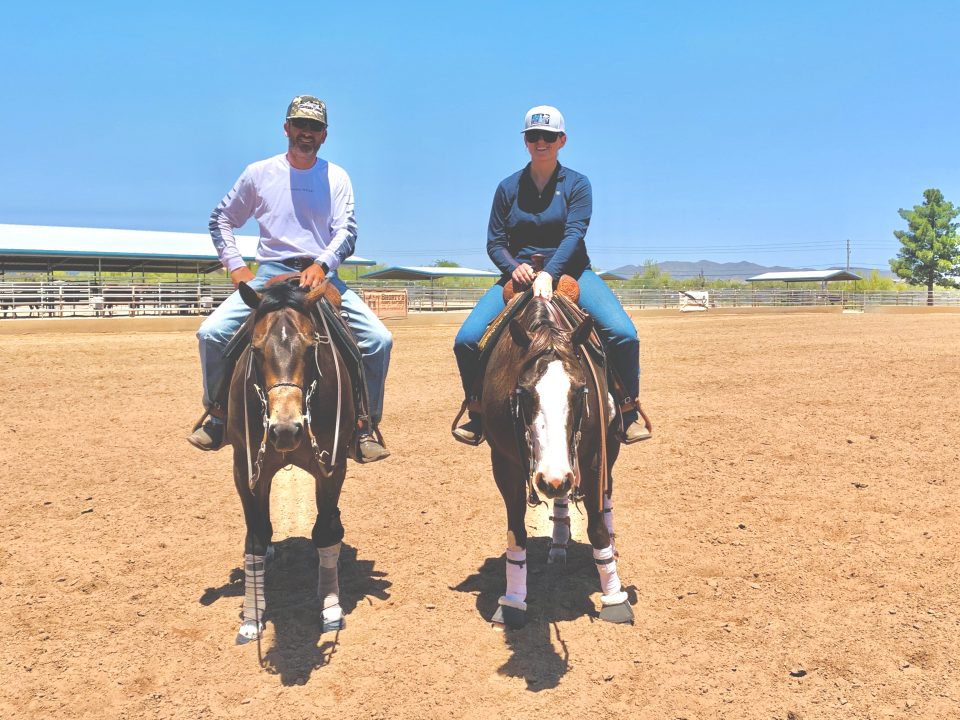Working abroad can have a big impact on your business.
By Abigail Boatwright

As an up-and-coming trainer, so much value can be gained from learning from more experienced horsemen. But if opportunities in your own country are limited—or the chance to work with a trainer in another country arises—working internationally can have many benefits. But before you update your passport and hop on a plane, you need to consider the logistics—and the challenges. We consulted with three trainers who’ve each spent time abroad while gaining experience under reining trainers to share their experiences.
David Hanson
Davis Hanson had the opportunity to work for Arcese Quarter Horses in Verona, Italy, from 1995 to 2000. Once back in the United States, he set up his training program in Northern California, where Hanson Performance Horses has been ever since. David Hanson trains open horses and coaches non pros. He says his time in Italy was enlightening and a great experience riding a lot of young horses, collaborating with competitive trainers visiting from America, and working at a beautiful facility with an outstanding breeding program.
How did you come to work abroad?
Hanson: Between Tom McCutcheon and Sergio Elia, they made the recommendation to Mr. Arcese on our behalf, and my wife and I agreed to a one-year commitment. At the end of that year, we renewed for additional time. We spent five years there.
What was it like tending to practicalities like housing, transportation, etc.?
Hanson: Fortunately for us, Arcese had an outstanding facility. We lived right there at the training facility. He provided us a car and paid for utilities. So we agreed on the monthly salary and basically purchased groceries. As far as employment, Mr. Arcese worked with various agencies to make sure we were legal for the duration that we were there.
What are some of the benefits you gained from working in another country?
Hanson: We traveled into Germany, Switzerland, and France to various shows. It was a great opportunity to travel, and we became close friends with a lot of the Italian trainers who we worked and showed with. We got to see equine facilities and meet owners, breeders, and trainers—it was a really neat experience. Some of the relationships we built, we’ve become lifelong friends and we communicate.
What are some challenges you experienced, and how did you handle them?
Hanson: There are various challenges that just come from living abroad: there’s the language barrier, for one. We worked very hard to develop a basic vocabulary in Italian. But many times, they wouldn’t mind trying to use their English, too. Everything is new, you don’t have friends and family close by, so it’s a very independent feeling to be in a foreign country with not many people you know nearby. I think for any individual traveling to a foreign country, you have to be confident in what you’re doing and rely on the relationships with those who become close to you. It opens your perspective, living in a foreign country, especially for five years. It just broadens your perspective on life.
What are some lessons you learned?
Hanson: I think it has enabled me to welcome and enjoy travel; to welcome some challenges and learn how to work through things. I think in the horse training business, we have to be problem-solvers, to resolve training issues and facility management issues and client relation issues. Living in a foreign country, you have to work through things and develop solutions.
How can someone find the right trainer or owner to work for in another country?
Hanson: Social media can connect people worldwide, but I think you really need to rely on word-of-mouth. Make sure you know where you’re going, who you’re going to be working with, living arrangements, salary, currency exchange, etc.
Do you have any advice for someone considering working abroad?Hanson: If you’re prepared to accept the challenges of it, the language, currency, being away from friends and family, and can commit to the hard work and dedication to the industry, the benefits pay off for years to come. There will be a homesick period. But if you really want to reap the benefits from it, you have to immerse yourself in that culture; accept the culture, the food, and the people; and get used to being far away from home. If you’re in it for the knowledge and the experience, and for the wonderful things that the horse industry provides for us, then you’re in it for the right reasons, and you’re going to appreciate it.
Read the rest of this article at the links above.



